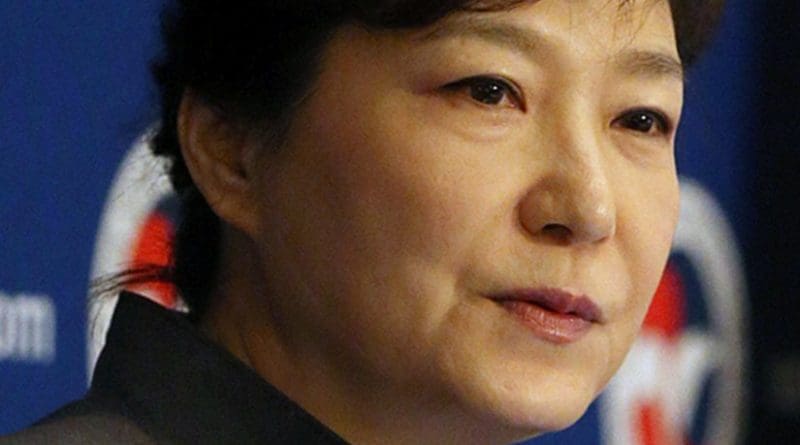South Korea’s New Opening To Iran – OpEd
South Korea’s president Park Geun-hye is on a three-day official visit to Iran, accompanied by a 236-person trade delegation, and intent on reversing the recent decline in the bilateral trade between the two countries, which has slipped from $10 billion dollar in 2011 to over $6 billion last year.
According to the Tehran media, the Koran Minister of Land, Infrastructure and Transportation, Kang Ho-in, has publicly stated his country’s determination to boost the Iran trade to $30 billion dollars a year. High on the agenda is a new energy agreement, in light of the announcement by Iran’s Oil Minister, Bijan Namdar Zanganeh, that the two countries are expected to sign a $20 billion dollar agreement during President Park’s high-profile visit. Clearly, this is a pivotal trip for President Park, whose country’s economy is adversely affected by a slowing world economy, and who reportedly seeks to solicit Iran’s assistance in dealing with its unruly North Korean neighbor.
Concerning the latter, a Wall Street report has claimed that President Park’s political purpose of the Tehran visit is to use the carrot of economic ties with Tehran to motivate the Tehran leaders to nuance their long-standing relations with North Korea in a way that would be in line with South Korea’s policy of containing and neutralizing the perpetual North Korean threat.
Certainly, Iran has the potential to mediate between North Korea and South Korea, as one of few countries in the world that has good ties with both sides. This possibility may have been explored in a prior visit of South Korea’s foreign minister, Yun Byung-se, last November and his extensive conversation with his Iranian counterpart, Mohammad Javad Zarif. A future trip to North Korea by Zarif may therefore be in the offing, assuming that all the preparatory works can be undertaken with utmost sensitivity to both sides, particularly the North Korean leadership that prizes its unique strategic relations with Iran and would, naturally, be averse to the idea of any new “balance” or “equidistance” by Tehran between Seoul and Pyongyang.
As a result, Tehran would have to thread these diplomatic waters with extra caution in order to avoid any unwanted damage to its traditional closeness to North Korea, which has been an important source of military technological assistance to Iran in the past. China too, which is widely regarded in Iran as a North Korean patron state, despite Beijing’s occasional unhappiness with the North Korean leadership’s dangerous brinksmasnship, is closely watching the development of Iran-South Korean relations and, therefore, Tehran is unlikely to make any premature commitment to any dispute resolution role between North and South Korea.
What matters most for Iran at the moment is the new post-sanctions opening of South Korea to Iran, which has been unable so far to gain much advantage from the West, as a direct result of the lingering American opposition. The softening of this opposition, partly due to a recent meeting of Zarif and the US Secretary of State John Kerry in New York, might be behind Park’s visit, i.e., a good omen that Washington is giving the green light to some of its allies to restore their past healthy relationships with Iran. Unfortunately, too many anti-Iran hawks in US Congress continue to throw legislative roadblocks for any normalization of US-Iran economic relations. But, per the terms of the recent nuclear agreement, US-owned foreign subsidies can engage with Iran — that may include some firms in South Korea.
An important aspect of South Korea’s new opening to Iran is in the realm of banking, given the continuing reluctance of western banks to engage with Iran, in light of a recent statement by South Korea’s ambassador to Tehran, Song-Woong Yeob, that “the two countries have good banking interactions that have resulted in boosting economic exchanges between Seoul and Tehran.” Following the footsteps of Italian and Austrian banks, the willingness of South Korean banks to do normal business with Iran will undoubtedly have salutary effect in impressing some other countries’ banks to similarly drop their hesitations and open up to Iran.
From the point of view of the Rouhani administration, which is under fire at home for being unable to show much tangible economic results from the nuclear deal, blamed almost entirely on US’s lack of cooperation, the ability to restore ties with South Korea in a new post-sanctions environment represents a timely achievement, for both economic and political purposes. It is, in other words, a win-win meeting for both the South Korean and Iranian presidents.

